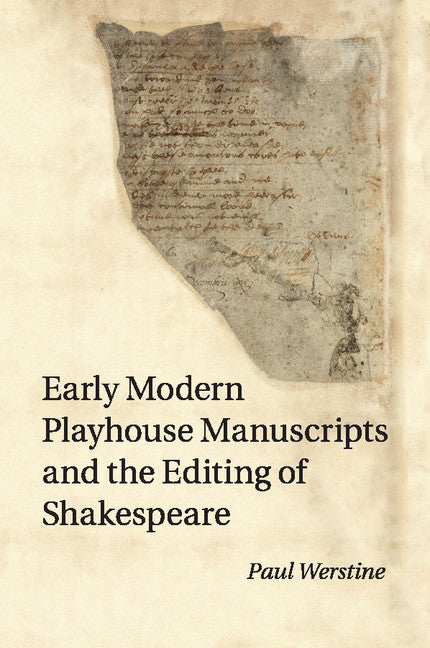Freshly Printed - allow 8 days lead
Couldn't load pickup availability
Early Modern Playhouse Manuscripts and the Editing of Shakespeare
This book argues for editing Shakespeare's plays in a new way, without pretending to distinguish authorial from theatrical versions.
Paul Werstine (Author)
9781107515468, Cambridge University Press
Paperback / softback, published 9 April 2015
448 pages, 55 b/w illus. 2 tables
22.9 x 15.1 x 2.2 cm, 0.64 kg
'… a remarkable scholarly achievement.' Ivan Lupi?, Sharp News
Early Modern Playhouse Manuscripts and the Editing of Shakespeare argues for editing Shakespeare's plays in a new way, without pretending to distinguish authorial from theatrical versions. Drawing on the work of the influential scholars A. W. Pollard and W. W. Greg, Werstine tackles the difficult issues surrounding 'foul papers' and 'promptbooks' to redefine these fundamental categories of current Shakespeare editing. In an extensive and detailed analysis, this book offers insight into the methods of theatrical personnel and a reconstruction of backstage practices in playhouses of Shakespeare's time. The book also includes a detailed analysis of nineteen manuscripts and three quartos marked up for performance - documents that together provide precious insight into how plays were put into production. Using these surviving manuscripts as a framework, Werstine goes on to explore editorial choices about what to give today's readers as 'Shakespeare'.
Introduction: reading W. W. Greg
1. The discovery of 'foul papers'
2. Redefining foul papers
3. Playhouse MSS: what bookkeepers did not do
4. Playhouse MSS: what bookkeepers did
5. Behind the stage/in the tiring house
Conclusion
The manuscripts
Appendix A. Characteristics of Gregian 'foul papers' in playhouse texts
Appendix B. Knight's placement of stage directions in Beleeue
Appendix C. Physical evidence of dramatist-bookkeeper collaboration.
Subject Areas: Publishing industry & book trade [KNTP], Shakespeare studies & criticism [DSGS], Literary studies: c 1500 to c 1800 [DSBD]


